lecture 6 新闻英语翻译
Lecture 3 翻译的标准

Lecture 3 翻译的标准翻译标准:目前翻译界普遍接受的,也是作为一般翻译学习者必须努力掌握的标准,简而言之是两条:忠实(Faithfulness) 和流畅(Smoothness)。
外语腔是初学翻译者不知不觉地会在汉语译文中表现出来的一种不当倾向。
翻译时所要表达的内容来自外语原文,原文的词语和结构形式随着内容一起进入到我们的大脑,于是原文的语言形式被带入译文,造成了译文的外语腔。
The only concession he made to the climate was to wear a white dinner jacket.【译文】气候变化,他仅稍稍作了一点变通,赴宴时穿了件白色的短礼服。
翻译标准:忠实和流畅好的译文还必须保持原文的风格包括民族风格、时代风格、语体风格、作者个人的语言风格等。
即:译者不能破坏或改变原文的风格,不能以译者的风格代替原作的风格。
课堂练习:•She couldn't have come at a better time.•She has been a widow only six months.•I believe the speech was needlessly stubborn.•The Englishman feels no less deeply than any other nationality.•From a physical standpoint, there ought to be as many colours as there are different wave lengths.•As a human being, we should demonstrate our intellectual and moral superiority by respecting others for who they are -- instead of rejecting them for who/what they are not.1. 她来得正是时候。
翻译lecture six
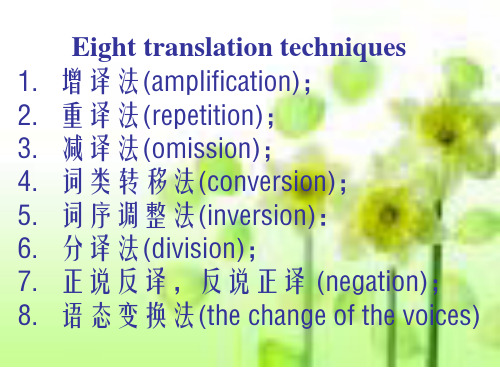
会谈笑风生,问题是要碰到她们高兴的时候;她们 也不是不会待人和颜悦色,问题在于她们是否乐意 这样做;可惜的是,她们一味骄傲自大
• The fan,with its modern,elegant,bright,and harmoniously colored design,is an excellent electrical household appliance for cooling purposes on hot summer days.
• 老人说,“听人说,从前他爸爸是个打鱼的。
他过去d never thought I’d be happy to find myself considered unimportant. But this time I was.
以往我从未想过,当我发觉人们认为 我是无足轻重时,我会感到高兴。但 这次情况确是如此 。
• 3The magistrates are free to burn down houses while the common people are forbidden even to light lamps. (One man may steal a horse while another may not look over the hedge.) • 4上班,做家务,交朋友,(这些)占用了我的全部时间。
After-class assignment
1. 这个小男孩饭前都洗手,然后用餐巾纸擦干。 2. 交出翻译之前,必须读几遍,看看有没有要修 改的地方。这样你才能把工作做好。 3 只许州官放火,不许百姓点灯。 4.My work,my family,my friend are more than enough to fill my time. 5.To err is human,to forgive divine.
新闻报道常用英语词汇及发音
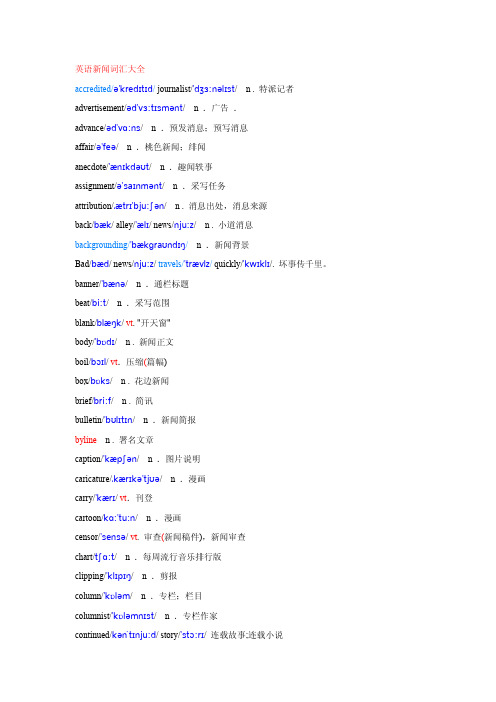
记者招待会 国际新闻协会
newspaper// agency// newsboy// 报童
subscription// (rate//) newsprint 新闻用纸 舰队街
报费
Fleet// Street//
时评 书评
book// review// topicality 时事问题
city// news// column// letters// 栏
社会新闻
读者投书栏 一般消息栏
general// news// column// cartoon,comics cut// 插图 漫画
government// organ// party// organ// 党报
trade// paper//
商界报纸 中文报纸 英文报纸 本国文报纸 日文报纸
Chinese// paper//
头号大标题
big// news// hot// news//
exclusive// news// scoop// feature// 特讯 特写,花絮 评论 社论
独家新闻
criticism// editorial// review,comment
总编辑
newsman, newspaperman//, journalist// cub// reporter// reporter// 初任记者
新闻记者
采访记者 随军记者
war// correspondent//, campaign// badge// columnist// 专栏记者 一流通讯员 通讯员
morning// edition// evening// edition// quality// paper// popular// paper// evening// paper//
lecture的意思用法大全
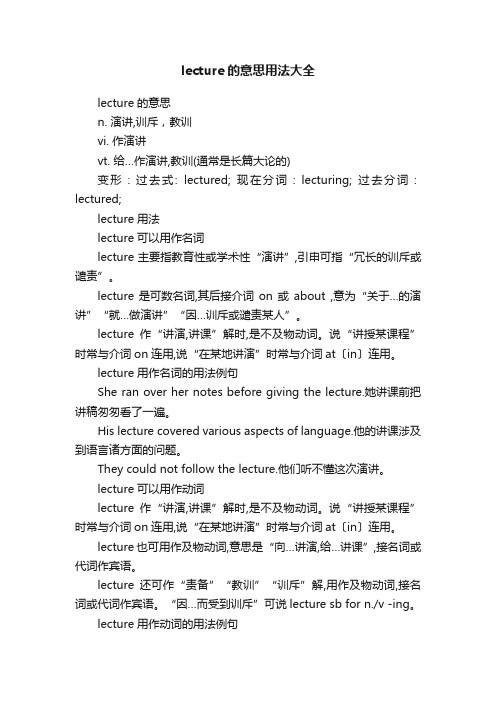
lecture的意思用法大全lecture的意思n. 演讲,训斥,教训vi. 作演讲vt. 给…作演讲,教训(通常是长篇大论的)变形:过去式: lectured; 现在分词:lecturing; 过去分词:lectured;lecture用法lecture可以用作名词lecture主要指教育性或学术性“演讲”,引申可指“冗长的训斥或谴责”。
lecture是可数名词,其后接介词on或about ,意为“关于…的演讲”“就…做演讲”“因…训斥或谴责某人”。
lecture作“讲演,讲课”解时,是不及物动词。
说“讲授某课程”时常与介词on连用,说“在某地讲演”时常与介词at〔in〕连用。
lecture用作名词的用法例句She ran over her notes before giving the lecture.她讲课前把讲稿匆匆看了一遍。
His lecture covered various aspects of language.他的讲课涉及到语言诸方面的问题。
They could not follow the lecture.他们听不懂这次演讲。
lecture可以用作动词lecture作“讲演,讲课”解时,是不及物动词。
说“讲授某课程”时常与介词on连用,说“在某地讲演”时常与介词at〔in〕连用。
lecture也可用作及物动词,意思是“向…讲演,给…讲课”,接名词或代词作宾语。
lecture还可作“责备”“教训”“训斥”解,用作及物动词,接名词或代词作宾语。
“因…而受到训斥”可说lecture sb for n./v -ing。
lecture用作动词的用法例句It was a shame for me to be lectured in front of the whole class.当着整个班级的面被训斥了一顿,真让我感到羞辱。
He lectured to his students on modern writers.他给学生们讲了关于现代作家的一课。
英文一分钟演讲稿带翻译6篇
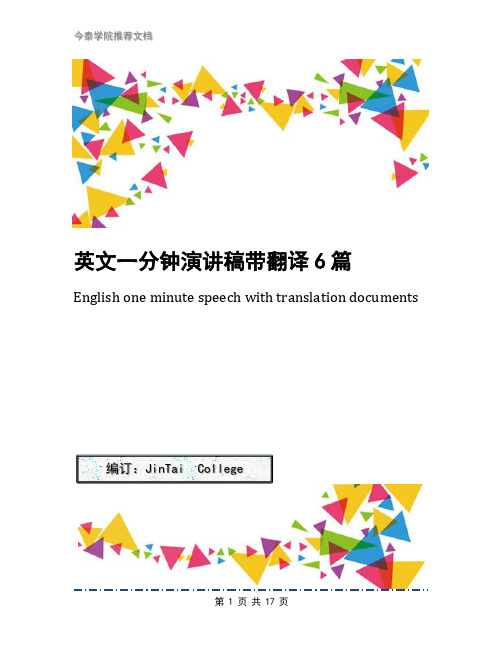
英文一分钟演讲稿带翻译6篇English one minute speech with translation documents 编订:JinTai College英文一分钟演讲稿带翻译6篇小泰温馨提示:演讲是指在公众场合,以有声语言为主要手段,以体态语言为辅助手段,针对某个具体问题,鲜明、完整地发表自己的见解和主张,阐明事理或抒发情感,进行宣传鼓动的一种语言交际活动。
本文档根据题材主题演讲内容要求展开说明,具有实践指导意义,便于学习和使用,本文下载后内容可随意修改调整及打印。
本文简要目录如下:【下载该文档后使用Word打开,按住键盘Ctrl键且鼠标单击目录内容即可跳转到对应篇章】1、篇章1:英文一分钟演讲稿带翻译2、篇章2:英文一分钟演讲稿带翻译3、篇章3:英文一分钟演讲稿带翻译4、篇章4:英文一分钟脱稿演讲稿5、篇章5:英文一分钟脱稿演讲稿6、篇章6:英文一分钟脱稿演讲稿英语演讲在我们的生活中越来越普遍,你想知道英文一分钟演讲稿怎么写吗?下面是小泰为你整理的几篇英文一分钟演讲稿带翻译,希望能帮到你哟。
篇章1:英文一分钟演讲稿带翻译Dear students:How are you!In the previous several exams, I have gained good results, first of all thanks to my efforts, of course, learning is also very important. Next, I gave you about my learning experience.I feel good in order to learn first-come interested in learning. As the saying goes: "Interest is the best teacher." With interest will be motivated to learn, the more naturally learn better. Second, in order to improve learning, we must master the correct way to learn, learn to digest, giving top priority, this is the most important. In learning, our minds must have three words - "Why!" Smart people know that; wise men know to listen to; smart people know to ask. The last is sure to be hard work, this is the most important, even Thomas Edison said "Genius needs ninety-nine percent perspiration."School should seriously lectures, and pay attention to more independent thinking, do not know want to ask, to exercise their thinking skills.Careful and meticulous to teacher assignments, mustnot be careless.There is, to take notes, preview before clathe best, first have a preliminary understanding of the text, which for the next clacan more easily absorb. After-school must also be reviewed, and consolidatethe knowledge about good teachers, and lay a solid foundation. The ancients have said: "Reviewing the Old, to be a teacher." Not also the truth? Best to pay attention to work and rest. Only care about the death of reading is of no use to let my mind relax properly for the job such as playing baseball, listening to music, watch TV news.Finally, I want to say "do notyou go stronger than others, then you have to and they are better than weak, you challenged yourself to stay on a par before himself, and you will reap better than others."I finished the speech Thank you!亲爱的同学们:你们好!在前面的几次考试中,我都获得了不错的成绩,这一切首先要归功于我的努力,当然学习方式也是非常重要的。
Lecture 6 旅游翻译

常用语句翻译: 常用语句翻译:海关
May I have your name, sir/madam/miss? / What is your name? 请告诉我您的姓名,先生/女士/小姐。 May I see your passport and declaration forms please? / Show me your passport and visa, please. 请把护照和申报表给我。/请把护照和签证给我。 Do you have anything to declare? /Have you got anything to declare? 您有需要申报的物品吗? Lecture 4
常用语句翻译: 常用语句翻译:飞机广播
Ladies and gentlemen, welcome to ________ Airport. Local time is ________ and the temperature is ________. 各位乘客,欢迎到来XX机场,当地时间是XX,气温为XX。 For your safety and comfort, we ask that you please remain seated with your seat belt fastened. 为了大家的安全,请大家系好安全带,在座位上坐好。 Please check around your seat for any personal belongings you may have brought onboard with you. 请大家检查好随身物品,以免遗漏。 Lecture 4
实用英汉翻译
常用语句翻译: 常用语句翻译:飞机广播
If you require deplaning assistance, please remain in your seat until all other passengers have deplaned. One of our crew members will then be pleased to assist you. 下机时若需要帮助,请在座位上等待,让其他乘客先下,我们 的乘务员将非常高兴为您提供帮助。 On behalf of ________ Airlines and the entire crew, I’d like to thank you for joining us on this trip and we are looking forward to seeing you on board again in the near future. Have a nice day/evening/night/stay!” 我代表XX航班全体乘务人员,感谢您乘坐本次航班,期待您 再次乘坐。祝您一路顺风! Lecture 4
lecture 6 汉英句式翻译
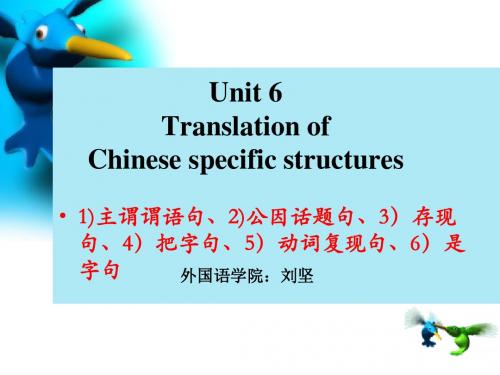
III. 存现句的翻译
• 存现句1.存现句含义 • 存现句,指的是说明某处或某时有某人物存在、出 现、消失的句子。 • 如: • ①河里漂着两只船。(存在) • ②前面来了两个客人。(出现) • ③昨天走了两个陌生人。 (消失)
• •
• • •
• 1. 有+名词+附加语(v., adj., phase etc. ) 1)译为英语存现句: 有人敲门。-There is someone knocking./ Some one is at the door. 有趟列车六点出发。-There is a train due to leave at six. 可能已有些疑点出现在他的案子中。 There could be a few doubts/suspicion in his case.
I. 主谓谓语句(sentence with a subject-predicate phrase as predicate)的翻译
(Topic-prominent structure VS Subject-prominent structure)
• 1) 大小主语是总体和部分的关系:大主语译成 定语,小主语改为句子主语 • (1) 我国的国民经济,工业和农业都是基础。 • Both industry and agriculture are the foundation of national economy in our country. • (2) 总共五个人,三个病了干不了活。 • Three of five persons in all are not able to work because of illness. • (3) 敌人活着的,全都缴械投降。 • All of the still living enemy surrendered their arms. (laid down their arms and surrendered.)
lecture6译文(1)
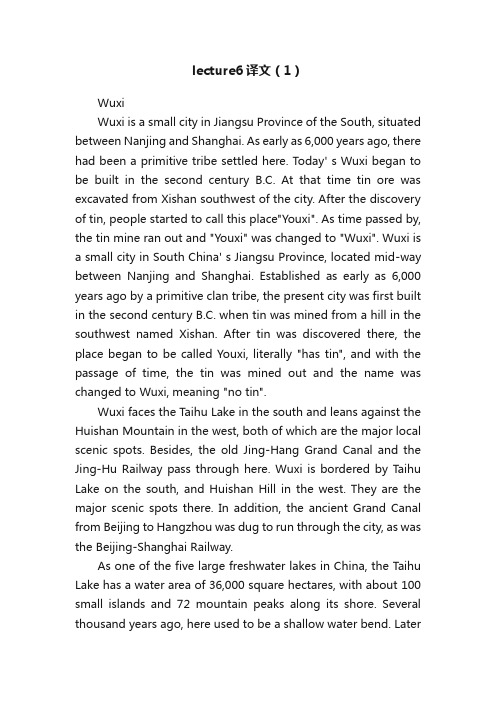
lecture6译文(1)WuxiWuxi is a small city in Jiangsu Province of the South, situated between Nanjing and Shanghai. As early as 6,000 years ago, there had been a primitive tribe settled here. Today' s Wuxi began to be built in the second century B.C. At that time tin ore was excavated from Xishan southwest of the city. After the discovery of tin, people started to call this place"Youxi". As time passed by, the tin mine ran out and "Youxi" was changed to "Wuxi". Wuxi is a small city in South China' s Jiangsu Province, located mid-way between Nanjing and Shanghai. Established as early as 6,000 years ago by a primitive clan tribe, the present city was first built in the second century B.C. when tin was mined from a hill in the southwest named Xishan. After tin was discovered there, the place began to be called Youxi, literally "has tin", and with the passage of time, the tin was mined out and the name was changed to Wuxi, meaning "no tin".Wuxi faces the Taihu Lake in the south and leans against the Huishan Mountain in the west, both of which are the major local scenic spots. Besides, the old Jing-Hang Grand Canal and the Jing-Hu Railway pass through here. Wuxi is bordered by Taihu Lake on the south, and Huishan Hill in the west. They are the major scenic spots there. In addition, the ancient Grand Canal from Beijing to Hangzhou was dug to run through the city, as was the Beijing-Shanghai Railway.As one of the five large freshwater lakes in China, the T aihu Lake has a water area of 36,000 square hectares, with about 100 small islands and 72 mountain peaks along its shore. Several thousand years ago, here used to be a shallow water bend. Lateron the Changjiang Delta gradually expanded and connected with the dikes and dams in the gulf, thus forming an interior lake and turning the original isles into mountain peaks. With its misty water, the Taihu Lake is surrounded by grotesque peaks. This nature-made scenery of lakes and mountains is so beautiful that one simply cannot take them all in. The Taihu Lake is one of the five largest freshwater lakes in China. Covering a water area of 36,000 hectares, it has scores of islets and 72 peaks along its banks. Thousands of years ago, the lake was a shallow bay. Later the gradually expanding Yangtse Delta linked with the dykes in the bay and turned it into an inland lake and the original islets into the peaks along the water. The mist-covered surface of the water and surrounding peaks make Taihu a splendid natural landscape of mountains and lakes.The part of the Grand Canal in Wuxi is 40 kilometres long, of which 14.6 kilometres is in the urban area. With a history of over 2,400 years, this green chain of water is still running merrily, with many places of historic interest and scenic beauty along its bank. The cutting of this canal dated back to the 5th century B.C. and its full length is 1,794 kilometres. Like the 10-thousand-li Great Wall, it is also the symbol of China's ancient civilization. The Wuxi section of the Grand Canal is 40 kilometres long, with 14.6 kilometres in the city area. With a history of more than 2,400 years, this green belt of water still flows pleasantly with many scenic spots and historical sites on both banks. The Grand Canal was first dug in the 5th century B.C. and is 1,794 kilometres. Like the Great Wall, this project is a symbol of ancient Chinese civilization.The Canal is both narrow and deep in Wuxi, and along the two banks there are rows of old-style dwelling houses with greentiles and white walls. The canal at Wuxi is narrow and deep, and row upon row of old residential buildings with white walls and black tiles stand along both sides.Every year there are many tourist activities in Wuxi and from 8th to 14th this October, there will be a "Wuxi Taihu International Fishing Competition, "which can be entered for by both individuals and groups, professionals and amateurs. Wuxi arranges many tourist programmes each year and during the coming October 8--14, there is a"Wuxi Taihu International Angling T ournament". Catering to both professionals and amateurs, the contest can either be entered in group or singles.译文二WuxiWuxi is a small city in South China' s Jiangsu Province, located mid-way between Nanjing and Shanghai. Established as early as 6,000 years ago by a primitive clan tribe, the present city was first built in the second century B.C. when tin was mined from a hill in the southwest named Xishan. After tin was discovered there, the place began to be called Youxi, literally "has tin", and with the passage of time, the tin was mined out and the name was changed to Wuxi, meaning"no tin".Wuxi is bordered by Taihu Lake on the south, and Huishan Hill in the west. They are the major scenic spots there. In addition, the ancient Grand Canal from Beijing to Hangzhou was dug to run through the city, as was the Beijing-Shanghai Railway.The Taihu Lake is one of the five largest freshwater lakes in China. Covering a water area of 36,000 hectares, it has scores of islets and 72 peaks along its banks. Thousands of years ago, the lake was a shallow bay. Later the gradually expanding Yangtse Delta linked with the dykes in the bay and turned it into an inlandlake and the original islets into the peaks along the water. The mist-covered surface of the water and surrounding peaks make Taihu a splendid natural landscape of mountains and lakes.The Wuxi section of the Grand Canal is 40 kilometres long, with 14.6 kilometres in the city area. With a history of more than 2,400 years, this green belt of water still flows pleasantly with many scenic spots and historical sites on both banks. The Grand Canal was first dug in the 5th century B.C. and is 1,794 kilometres. Like the Great Wall, this project is a symbol of ancient Chinese civilization.The canal at Wuxi is narrow and deep, and row upon row of old residential buildings with white walls and black tiles stand along both sides.Wuxi arranges many tourist programmes each year and during the coming October 8--14, there is a"Wuxi Taihu International Angling Tournament". Catering to both professionals and amateurs, the contest can either be entered in group or singles.第六讲主语的确定汉语:意合语言,重意念,轻形式英语:行合语言,重形式,讲逻辑如何确立主语?一、补充主语汉语句子中主语旺旺不突出,很多句子为无主句。
- 1、下载文档前请自行甄别文档内容的完整性,平台不提供额外的编辑、内容补充、找答案等附加服务。
- 2、"仅部分预览"的文档,不可在线预览部分如存在完整性等问题,可反馈申请退款(可完整预览的文档不适用该条件!)。
- 3、如文档侵犯您的权益,请联系客服反馈,我们会尽快为您处理(人工客服工作时间:9:00-18:30)。
三、新闻英语的句法特点及翻译
1, 时态的使用。 在英语新闻中现在时被广泛使用。为了造成事件正在进 行中的效果, 给人以真实感, 无论是标题或是正文都常常 采用现在时代替过去时, 这可对读者产生一种“某事正 在发生”的印象,从而增强其真实感和现实感。这叫“新 闻现在 时 ”。 如:A Ground War Begins 地面战打响了. Deposits, Loans Rising in HK 存贷款额在港回升 甚至在said, told, reported, added等动词过去时 后面的that宾语从句中,过去时也常常为现在时态所替 代。
5)冒号既表示说、声称又替代“be” WTO Entry to Create More Jobs: Experts 专家认为:入世可创造就业机会 Chinese Cooks: Masters at Turning a Turnip into a Flower 中国厨师技艺佳 掌中萝卜雕成花 6)介词省略 Police killer’s jail death (= the death in the jail of the man who had killed a policeman) 杀害警察的凶手狱中毙命
小康社会 a well-off society
和谐社会 harmonious society
以人为本 human-oriented 竞争上岗 compete for a post 闪婚 Lightning Marriage
月光族 Moonlight Group
2.标题中使用省略句。 如冠词、动词、介词等常在标题省略, 既可节省版面, 又 可使新闻的风格显得简洁明快。 一般说来,新闻包括标题(headline)、导语(lead)和正文 (body)三个部分。标题高度概括了整条新闻的主要内容, 是信息量最集中、最丰富的地方。 如: House and Senate Pursuing Efforts to Reduce Deficit (The New York Times) =The House of Representatives and Senate are pursuing the efforts to reduce the deficit.
(3)节俭性(brevity) 节俭是精练语言的重要手段,也是出于报刊节约篇 幅的实际需要。要在有限的篇幅里报导尽可能多的 内容,新闻写作人员就得采取一切手段来浓缩和精 炼语言。
2、新闻英语的文体特点 成功的新闻报导不但应符合新闻的标准格式:明白迅 速地描述事实,客观清晰地提供信息,且须百分之百地 遵守ABC原则 即内容准确无误(accuracy) 语言精炼(brevity) 思路明晰(clarity) 所以新闻报导必须及时、迅速、客观、公平、可信。
在某种意义上来说,掌握约定俗成的行业套语,可以保证 新闻工作的效率。同时,在翻译此类语汇时,也有约定俗 成的表达方式。例如:
4.使用“小词”(short words) 小词即简短词, 一般为单音节词。小词的广泛使用一 是由于报纸篇幅有限, 用小词可以免于移行, 此外, 由 于小词的词义范畴很宽, 一般比较生动灵活。 如: 支持 back 禁止 Ban 表达 Voice
The Bush administration has no objection to a trip to China by former president Bill Clinton who was briefed by senior officials. 据高级官员透露,前总统比尔· 克林顿将出访中国,布什政 府对此未予以反对。 2.新词(neologism) (1) 随着社会新事物的产生会产生一些新的词汇。这些 词与特定的政治、社会、环境有关,有着显著的社会性。 例如: 廉政建设 clean government building
wed-in 集体婚礼
3.约定俗成的语汇(conventional vocabulary) 为了保证新闻的可理解性,新闻撰写者必须采用人们 熟悉的表 达、叙事方式,并遵循一定的写作程式。常用的约定俗 成的语汇如: Father Time 时间 Mother Nature 自然
素质教育 quality-oriented education system 弱势群体 disadvantaged groups 包二奶 have a concubine 菜篮子工程 Shopping basket project
豆腐渣工程 Jerry project 灰色收入 Off-the-book income 拜金 Money worship
3.语态的使用
3.1频繁地使用被动语态
英语新闻报刊文体一方面倾向于用主动语态,这样可以给 读者一种直接感,使叙述具有直言不讳的效果;
另一方面,被动语态越来越频繁地出现。因为新闻报道中 读者所关心的往往是施动者(动作的发出者)的情况,比如 在有关灾难、战争、事故等报道中,读者关心的是伤亡人 员、与之相关的具体数字或进展等。因此,被动语态在新 闻文体中的使用频率多于其他文体。 翻译中,可以灵活处理新闻报刊文体的被动语态,除非有必 要突出受动者(动作的接收者),否则不要译成被动语态。
Lecture
6
Translation of News English
一、新闻英语概述 新闻英语(Newspaper English or News English) 主要指英文报刊上常见的各类文章, 体裁多样, 内容 涉及广泛, 如: 时事报道、特写、广告、公报、文 艺作品、述评、访谈、学术介绍等等, 其题材广泛, 内容包罗万象。 新闻英语的主要功能是最快和最大限度地传递信息。 它和科技文体、公文文体和广告文体等构成了英语 中常见的实用文体,但它与讲究生动形象、含蓄温 馨和追求各种艺术效果的文学语言相比,或者同以 表义和移情为商业目的、实现劝说功能的广告语言 相比,也具有自身鲜明的语言特色和文体特点。
标题中虚词的省略是它的重要特点之一,一般而言, 标题中虚词省略现象主要表现在以下几个方面。 1 )冠词基本省略(omission of the article) Three Gorges Flooded By 'Farewell' Tourists (= The Three Gorges Are Flooded By 'Farewell' Tourists) 惜别之情难挡 游客蜂拥至三峡 2 )联系动词通常省略(omission of the link verb) Clinton Inauguration Most Expensive Ever (=Clinton Inauguration Is Most Expensive Ever) 克林顿就职典礼花费空前巨大
1、语言总体风格 从语言风格上讲,不同刊物有不同的语言风格,不同类 型的文章也有不同的文体特点,然而其写作都受一些共 同因素的影响,因而也形成了共同的新闻英语特色。 (1)大众性(popularity) 新闻刊物是大众传播媒介,读者面较宽,其语言必须适 应广大读者的阅读水平。 (2)趣味性 (vividness) 西方新闻界十分注重阅读趣味。为了增加报导的趣味 性,不仅要求报导内容,而且要求它所运用的语言要适 应读者的爱好和阅读习惯。
No comments 无可奉告 according to eyewitness/AP reports, etc 据目击者/美联社等报道 with guarded reserve 持审慎态度
5、广泛使用缩略语(Abbreviation )
缩略语在英语新闻标题中常被运用,它包括:缩写 词( i n i t i a l s ) 和简写词(abbreviations)。使用缩 略语可以尽可能地减少字母数,节省刊头空间,避免移 行。
3 )助动词通常省略(omission of auxiliary verb) India Mending Fences (=India is Mending Fences) 印度正在改善与邻国的关系 4 )连词通常省略(omission of conjunction),并用逗 号代替 US,Vietnam Resume Talks (= US And Vietnam Resume Talks) 美越恢复会谈
如:
(1)More than 50 million acres of farmland have been submerged and grain store damaged. Thousand of peasants have been shown on television trying to save their grain by loading sacks into boats or trying to move them to higher ground. 可译为: 五千多万亩粮田被淹,许多粮仓被毁。电视报道了成千上 万的农民在设法抢救粮食,他们或把麻袋装的粮食运到船 上,或者把它们转移到高处。
与时俱进 keeping pace with the times
丁克一族 DINK (Double Income No Kids)
户籍制度
